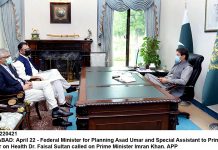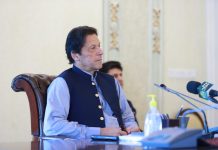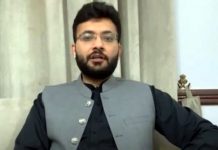Published on: September 3, 2025 3:44 AM
 Pakistan and China on Tuesday reaffirmed their commitment to strengthening the iron-clad and all-weather strategic cooperative partnership through enhanced cooperation, reflecting their unique bilateral relationship.
Pakistan and China on Tuesday reaffirmed their commitment to strengthening the iron-clad and all-weather strategic cooperative partnership through enhanced cooperation, reflecting their unique bilateral relationship.
The bilateral ties were discussed in a meeting between Prime Minister Shehbaz Sharif and Chinese President Xi Jinping at the Great Hall of the People.
Both leaders also discussed important regional and global developments and agreed to continue close cooperation between Pakistan and China in this regard.
Prime Minister Shehbaz reaffirmed the desire to continue working closely with China for the successful implementation of the next phase of upgraded China Pakistan Economic Corridor, with its five new corridors.
He congratulated President Xi Jinping on the success of the SCO Council of Heads of State Summit in Tianjin and offered his felicitations on the 80th anniversary of World’s Anti-Fascist War.
Lauding President Xi Jinping for his visionary and transformational leadership that has inspired China’s remaining journey towards modernization and progress, the prime minister said that Pakistan took great pride in China’s achievements and would always stand ready to work together with China in this great journey.
He appreciated China’s unflinching support to Pakistan’s territorial integrity, sovereignty, and socio-economic development, as well as the significance of the China Pakistan Economic Corridor as a flagship project of President Xi’s Belt and Road Initiative (BRI) to help both countries to build an even stronger Pakistan-China community with a shared future.
The prime minister hailed President Xi Jinping’s strong commitment to strengthen multilateralism and said Pakistan fully supported President Xi’s landmark steps in this regard including the Global Governance Initiative, Global Development Initiative, Global Security Initiative as well as Global Civilization Initiative.
These initiatives would serve the collective global good and contribute to regional as well as global peace, stability and development, he added.
President Xi said that China would continue to assist Pakistan in all fields of economic growth and development, especially as the two countries were now ushering in the second Phase of CPEC that would focus on Pakistan’s most important economic sectors.
Prime Minister Shehbaz renewed his “most cordial” invitation to President Xi Jinping to undertake an official visit to Pakistan next year, when both countries would celebrate the 75th anniversary of establishment of Pakistan-China diplomatic ties.
Separately, PM Sharif and President of the Russian Federation Vladimir Putin on Tuesday agreed to further enhance the bilateral ties and cooperation between the two countries in diverse fields.
In a meeting held in Beijing, the prime minister appreciated the leadership of President Putin for making sincere efforts to promote bilateral relations with Pakistan.
He observed that after their meeting in Astana during SCO Summit, they had agreed to work closely to bolster the bilateral cooperation.
The prime minister addressing the Russian president said, “Relations between the two countries have improved in the last many years due to your personal commitment and interest.”
He expressed the resolve that Pakistan was also keen to further strengthen the bilateral relations which were moving in the right direction.
The prime minister also underlined the significance of the trade corridor from Belarus, Russia, Kazakhstan, Uzbekistan, Afghanistan and Pakistan which would give a spur to the regional connectivity and prosperity.
Expressing his satisfaction, he said both sides were keenly committed to building their relations.
The prime minister also expressed gratitude to President Putin for supporting Pakistan which was viewed as ‘a balancing act in the region.’
He said Pakistan respected Russian Federation’s ties with India but they also wanted to build very strong relations with his country which would be supplementary and complimentary.
He expressed that these beneficial ties would add to the progress and prosperity of the region and assured President Putin to work closely in this context as he had found him ‘a dynamic leader’.
The prime minister responding to the Russian President’s invitation to attend the SCO Heads of Government Summit in November, replied that he was looking forward to visit the country.
President Vladimir Putin, expressing his views, said that they had held a meeting about one year ago, on the sidelines of SCO in Astana.
He said “Pakistan has always been their traditional partner and remains as such in Asia and they cherish these ties” adding both sides had agreed to intensify their bilateral relations.
The president noted that their bilateral trade required to be enhanced and in this regard, he stressed for taking steps to address the issue.
He also expressed his grief and sincere condolences to the people and the government of Pakistan on the losses suffered from catastrophes and natural disasters including the recent flooding.
President Putin expressed the optimism that under Prime Minister Sharif’s leadership, Pakistan would overcome such challenges.
He also opined that the two countries kept cooperating at the inter-parliamentary levels, adding “Pakistan is a non-permanent member of the United Nations Security Council and both countries are keeping contacts within the framework of the United Nations which is an important platform.”
He invited the prime minister to SCO Summit in Russia during November.
Also, the prime minister on Tuesday met President of Republic of Tajikistan where both leaders expressed their satisfaction on the ongoing cooperation between Pakistan and Tajikistan in all areas of mutual interest.
The two leaders, met here, agreed to enhance collaboration in diverse fields including trade and investment, connectivity, energy, regional security, culture, and people-to-people exchanges, a Prime Minister’s Office news release said.
Both leaders reaffirmed their commitment to further strengthening Pakistan-Tajikistan relations rooted in shared cultural, historical, and religious ties. The two leaders also shared perspectives on regional and global issues of common concern.










